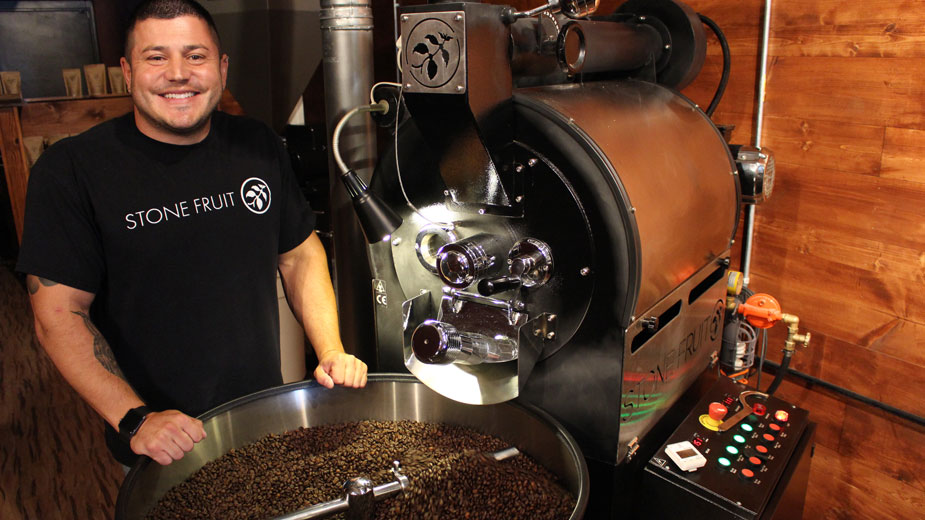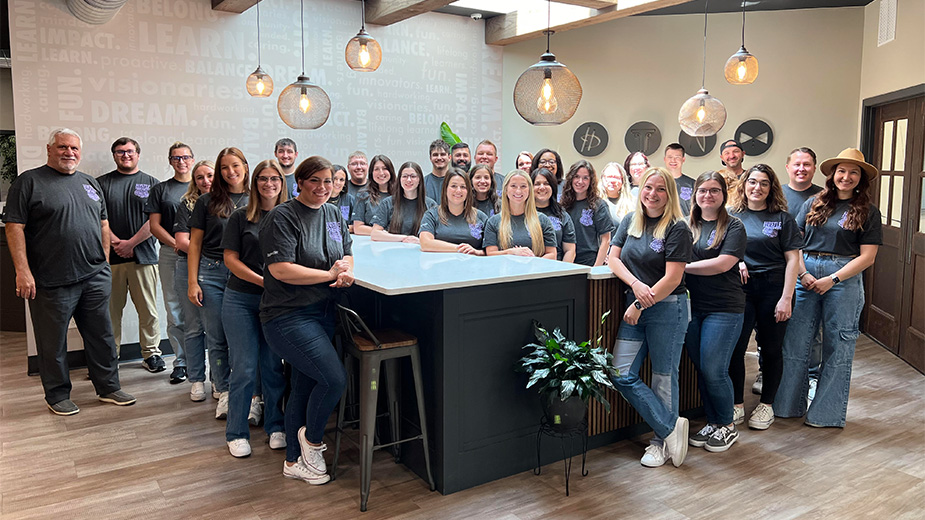Stone Fruit Adds Local Flavor to Coffee
BOARDMAN, Ohio — It seems a horrible situation for someone who loves coffee as much as Josh Langenheim, but the founder of Stone Fruit Coffee Co. isn’t bothered in the least with being unable to smell the coffee freshly roasted and brewed in his café, 8414 Market St.
It’s just what happens when you spend every day roasting and brewing for three years, he says as he walks away from his roasters, a small price to pay for doing what he loves.
“This is a hobby that’s gotten wildly out of control,” Langenheim says.
He began roasting coffee eight years ago in his garage, and did that five years before starting Stone Fruit in 2013 when he was laid off.
The coffee shop allowed him to combine what he loved – coffee – with something he was “halfway decent” at – marketing.
“I decided I could go get a minimum wage job or figure out how to market coffee,” he says.
His choice was obvious. Coffee won.
In the time since he founded Stone Fruit, Langenheim – dubbed its “chief coffee meister” – has latched firmly on to the core principles of third-wave coffee. Customers should know where the coffee beans are grown and by whom, how the beans are roasted and how their cup of joe is brewed.
The thought process is highlighted throughout Stone Fruit. Burlap bags of fresh beans are kept on pallets not far from the roasters, which he operates throughout the day.
At the bar, everything is set up so customers can watch a barista fill their orders. The espresso machine is mounted against the wall so customers can see the shots poured. The pour-over system is attached to the bar, less than a foot from the customer’s seat.
“I don’t want to hand people a cup of coffee and say, ‘It’s good. Trust me,’ ” he says. “I want people to know what makes this cup different from what they’ve had before. I’ll show you. I’ll give you a tour and explain how we make this exact cup.”
After years of roasting, the coffee meister knows which beans he wants. Through brokers such as Café Imports and Royal Coffee New York, Langenheim sources his product from “literally all over the world, from Guatemala, Brazil, India, Sumatra.”
The beans are turned into 30 varieties of coffee, mostly blends but also options for grounds that use just one variety of bean. For starters, he recommends his “Frankenstein” blend, which uses six varieties of beans.
That coffee, he explains, plays an important role in customers’ education, especially those used to coffee from chains that lack variety.
“I’ll ask what do you like about it and what don’t you like,” he says. “If you say it’s too dark, or there’s too much hickory, or it’s too floral, then we move on from there and figure out exactly which coffee is right for you.”
In total, Stone Fruit roasts about 300 pounds of beans every week, the equivalent of 4,860 cups, even though some of it is bagged and sold as grounds.
Except for growing the beans – which, obviously can’t be done in northeastern Ohio – everything at Stone Fruit is done specifically for the coffee shop, even beyond the coffee itself.
The ventilation system that feeds the roasters was custom-designed for the space and the Stone Fruit signs that hang above the café merchandise were manufactured by Converse Custom Metal Design in Canfield. The tables and bar were handmade by an employee, Ben Ilich.
“From the flooring to the color of the stain to the lighting, it’s all about comfort. We want you to talk in and think it feels like home,” Ilich says. “The idea was we wanted someone to walk in here and feel comfortable enough to sit in here for an hour, two hours, their whole day if they wanted to.”
The walls are a deep red, the tables an almost glowing light brown and the lights emit a soft orange glow. On the TVs, videos of fireplaces are on loop. And customers do, in fact, stay for hours in some cases, chatting with Ilich, Langenheim and other employees.
At Stone Fruit, the employees’ goal is to enjoy what they do and for their jobs to be a two-way street, Langenheim says. They learn to roast and brew coffee as he learns skills from them. That allows baristas to do what they love – just as he created a job to do what he loves. That philosophy has underpinned the business since the beginning.
“An entrepreneur is the only person who’d rather work 18 hours for themselves than eight hours for someone else,” he says. “That concept goes to our employees. When it’s someone’s day off, they stop in because it’s a fun place to hang out and be creative.”
Ilich’s passion isn’t necessarily coffee, Langenheim explains, but woodworking and building. By bringing him to Stone Fruit, Ilich has a chance to work on what he really wants as he works with coffee.
A mural above the pallets of beans was done by Christian Powers, whom Langenheim later hired on as a barista.
“Can he make coffee? Sure, but it’s not his No. 1 passion,” the owner explains. “That’s being an artist, so we’ll let him be an artist while he makes coffee.”
And by infusing that flexibility into his workplace, Langenheim has created a buy-in. Weekly staff meetings allow workers to toss around ideas to improve the store. Almost every change or addition to the store has resulted from their ideas or a customer’s suggestion.
“This is a collective and collectively, we’re stronger than any individual,” he says.
Working with employees so they can pursue what they want also fits into Langenheim’s second passion, the Mahoning Valley. By letting people do what they want (provided they pay attention to making coffee), they have avenues to pursue their dreams without leaving the Valley.
Langenheim, a graduate of Boardman High School and Youngstown State University, has seen many of his classmates and friends move on from Youngstown because they felt they lacked the opportunities they sought. Stone Fruit is, in part, his attempt to remedy that.
“I’m a local guy doing local things. That’s the movement that we want and that we need,” he says. “Take pride in your community and do it here.”
Langenheim’s pride also manifests itself in the names of his coffee blends. Almost all feature references to the Mahoning Valley, with titles such as “Tech Belt,” “Espresso ’77” and “Black Monday.”
Stone Fruit also features shirts from two local brands, Flight School Apparel and Rusty Waters Apparel, both created by Youngstown natives. Flight School designed the employee T-shirts, which are available for sale.
“It’s great that everyone’s getting the creativity to show off this area. To have outlets and know that someone’s wearing one of my shirts that I didn’t sell to them is amazing,” says Jovan Gonzalez, one founder of Flight School.
For Flight School co-designer Dominic Gatti, what stands out about Stone Fruit is the openness of everything and the ability to see the behind-the-scenes workings.
“It’s the wave in what people want. People want visibility and transparency,” Gatti says. “And coming from the manufacturing heritage, people want things that are made in America, in Ohio and in the Valley.”
And now that Stone Fruit has completed its expansion in Boardman Langenheim has his sights set on a second cafe near YSU just off Lincoln Avenue.
While the new space will house only a coffee bar, everything else will be the same, down to Stone Fruit’s core principles.
“When you put this much time and effort into a concept and just keep going, it’s amazing to see what you can really do,” Langenheim says. “That’s where we are and [the expansion] is a result of that. We just don’t stop.”
Pictured: Stone Fruit Coffee Co. “chief coffee meister” Josh Langenheim says the business is simply a hobby that got “wildly out of control.”
Copyright 2024 The Business Journal, Youngstown, Ohio.


